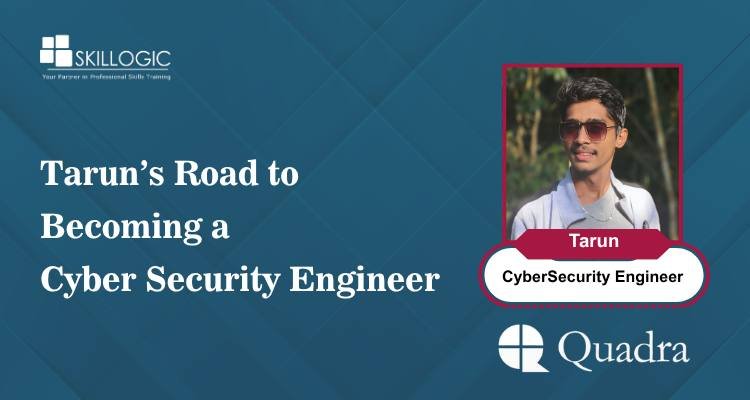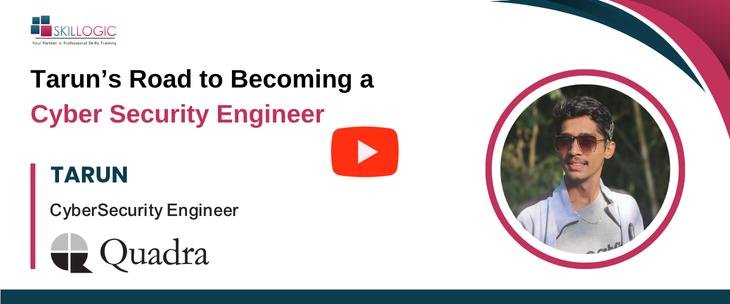Tarun’s Road to Becoming a Cyber Security Engineer
Discover Tarun’s inspiring journey from a BCA student to a Cyber Security Engineer at Quadra Systems.net with SKILLOGIC’s hands-on training and mentorship.

Tarun’s journey to becoming a Cyber Security Engineer is an inspiring story of dedication, curiosity, and consistent effort. Starting as a BCA student from Shimoga University, Tarun discovered his passion for cyber security, especially the offensive side, where identifying vulnerabilities fascinated him. This led him to join SKILLOGIC’s cyber security course, which offered a perfect balance of hands-on training and conceptual learning.
By spending several hours daily practicing networking, operating systems like Kali Linux and Windows, and tools such as TryHackMe, Hack The Box, and Wireshark, Tarun gained strong practical skills. Internships further strengthened his knowledge in both offensive and defensive cyber security projects.
Today, Tarun is working with Quadra Systems.net in Bangalore, applying his expertise in real-world cyber security challenges. His journey shows how passion, disciplined learning, and practical experience can lead to a successful career in cyber security.
Let’s explore Tarun’s journey in detail, from his initial interest in cyber security and rigorous learning process to internships, mock interviews, and finally securing his first professional role.
Tarun’s Journey from Cyber Security Training to cyber security Engineer Role
In this section, we share how Tarun’s training in the SKILLOGIC Cyber Security course helped him secure his role as a Cyber Security Engineer. The combination of hands-on practical training, consistent learning, and self-driven exploration enabled him to build strong skills in both offensive and defensive cyber security. These factors were crucial in preparing him for real-world challenges and successfully transitioning from a student to a professional in the cyber security field.
Q1. Can you share your background and how you got interested in cyber security?
I completed my BCA from Shimoga University, where my interest in cyber security started to grow. Initially, I was drawn to the offensive side of cyber security, particularly finding vulnerabilities in websites and software. Exploring flaws and learning how systems could be secured fascinated me, and that curiosity led me deeper into the field. While I enjoyed ethical hacking and penetration testing, I also developed an appreciation for the defensive side of cyber security as I learned more about protecting systems.
Q2. How did you learn about SKILLOGIC and why choose it?
I discovered SKILLOGIC through Google searches and YouTube reviews. Many students shared positive feedback about their practical approach and placement success. After comparing several institutes, I decided to join SKILLOGIC because it offered a well-structured cyber security course with both theoretical and hands-on practical training. I opted for offline classes since I preferred face-to-face learning and interaction with trainers.
Q3. What was your learning experience like at SKILLOGIC?
My experience was excellent. The course started with theoretical concepts for the first few sessions, followed by intensive practical sessions. I appreciated how the trainers emphasized real-world applications. SKILLOGIC focused heavily on hands-on practice, which helped me understand how cyber security tools and techniques are used in real-time environments.
I dedicated around five hours daily to learning one hour in the morning, a few hours in the evening, and at night. This consistent schedule helped me strengthen my skills in networking, operating systems like Kali Linux and Windows, and tools like TryHackMe and Hack The Box.
Q4. How did you handle doubts or difficulties during your learning process?
Whenever I faced challenges or had doubts, I used platforms like ChatGPT, YouTube, and Google to clarify my questions. While some students prefer reaching out to mentors directly, I enjoyed exploring and finding solutions independently. This habit of self-learning made me more confident and resourceful, which is crucial in cyber security.
Q5. What was your internship experience like with SKILLOGIC?
The internship was a great opportunity to apply my knowledge practically. Although it was conducted online, I learned a lot about using various tools, identifying vulnerabilities, and analyzing network traffic using Wireshark. I also learned how to detect and investigate unstable or suspicious network activities, which strengthened my understanding of real-world cyber security challenges.
Q6. How was your SOC internship, and what skills did you gain?
Yes, I worked on a defensive cyber security project during an internship at Infot Solutions. There, I implemented a Wazuh tool in an isolated environment to monitor end devices. It helped detect brute force attacks, unknown traffic, and suspicious activity. This experience gave me a solid foundation in SOC operations and how cyber security monitoring tools work in real time.
Q7. Did SKILLOGIC help you with interview preparation and placement?
Yes, absolutely. I participated in multiple mock interviews conducted by SKILLOGIC. These mock sessions helped me understand what kind of technical and HR questions are usually asked, how to respond confidently, and how to improve my communication.
After a few attempts, I was able to clear the interviews successfully. The placement team also helped me build my resume, ensuring it was optimized for ATS (Applicant Tracking System). This support played a big role in helping me secure my first job.
Q8. How was your actual job interview experience?
The interview process consisted of two rounds: a technical round and an HR round. During the technical round, I was asked about networking concepts, SOC operations, threat intelligence, and frameworks like MITRE ATT&CK. I was initially nervous, but once I started answering, I felt more comfortable.
The interview was conducted online, and after performing well in both rounds, I was thrilled to receive my first job offer in cyber security.
Q9. What advice would you give to aspiring cyber security professionals?
My advice for beginners is to start with the basics, especially networking. Just like a building needs a strong foundation, cyber security starts with understanding how networks function.
Once you’re confident with networking, move on to operating systems like Linux and Windows. Use practical learning platforms like TryHackMe, Hack The Box, and Metasploitable to gain real-world experience. Consistent practice, curiosity, and self-learning will make a huge difference in your career growth.
Q10. Any final thoughts on your experience with SKILLOGIC?
SKILLOGIC played a crucial role in my journey from a student to a cyber security engineer. The institute’s practical-oriented learning, mock interviews, and placement support helped me gain confidence and land my first job.
I would strongly recommend SKILLOGIC to anyone who wants to pursue a career in cyber security. Their training modules, real-world projects, and supportive mentors make it one of the best institutes for cyber security training in India.
Refer these articles:
- Vijay’s Journey: From Fresher to Technical Support Engineer
- Selvi’s Journey: From Healthcare Professional to SOC Analyst
- Mahendra’s Journey: From Email Support to SOC Analyst
Key Insights from Tarun’s Cyber Security Journey
Tarun’s journey shows how dedication, practical learning, and the right guidance can help a student successfully transition into a professional cyber security role. His experience with SKILLOGIC highlights several factors that contributed to his success:
- Strong foundation in basics : SKILLOGIC’s structured approach helped Tarun grasp networking, operating systems, and core cyber security concepts before moving to advanced topics.
- Balanced learning with practice : The course combined theory with hands-on exercises using tools like Wireshark, TryHackMe, and Hack The Box, making it easier to understand concepts and apply them in real scenarios.
- Offline classroom experience : Attending classes in person allowed Tarun to interact directly with trainers, clarify doubts instantly, and gain practical exposure through live demonstrations.
- Guidance and mentorship : Mentors simplified complex topics, and discussions with peers helped Tarun view problems from different perspectives, enhancing his learning experience.
- Project-based learning for confidence : Internship projects such as vulnerability scanning, SOC monitoring, and network traffic analysis enabled Tarun to apply his skills, solve real-world problems, and gradually build confidence in cyber security tasks.
- Placement support and career guidance : The SKILLOGIC placement team assisted Tarun throughout the placement process, providing follow-ups and guidance to help him secure interviews.
- Interview preparation through fundamentals : By focusing on core concepts like OSI layers, network topologies, and SOC operations, SKILLOGIC prepared Tarun to confidently answer technical questions and tackle practical problem-solving in interviews.
- Successful career start : With consistent effort, structured training, and hands-on projects, Tarun secured his first role as a Cyber Security Engineer at Quadra Systems.net, Bangalore, proving that guided learning and practical experience lead to career breakthroughs.
In conclusion, Tarun’s journey is a perfect example of how dedication, consistent learning, and practical experience can lead to success in the cyber security industry. His story highlights that with the right guidance, like that provided by SKILLOGIC, anyone can build a strong foundation and achieve their dream of becoming a Cyber Security Engineer.
Tarun’s journey from a BCA student to a Cyber Security Engineer highlights the growing opportunities in the cyber security industry. According to the U.S. Bureau of Labor Statistics, the demand for cyber security professionals is increasing rapidly, with employment for information security analysts projected to grow by 29% from 2024 to 2034, much faster than the average for all occupations. This growth reflects the rising need for organizations to safeguard their digital assets and networks against evolving cyber threats, making it a promising career path for aspiring cyber security professionals.
Refer these article:
- How Much Is The Cyber Security Course Fee in Hyderabad
- Is Cyber Security Still a Hot Career Choice in Hyderabad
- How to Become a Cyber Security Engineer in Mumbai
- Cyber Security Careers in Mumbai: Skills, Salaries and Tips for Success
SKILLOGIC provides a complete Cyber Security Certification Training designed to give learners the skills needed to succeed in the IT security industry. The Cyber Security Professional Plus training includes Ethical Hacking, SOC Certification, network security, threat detection, and vulnerability management. The course runs for 4 months with more than 200 hours of learning, offering labs for practice, Real Time projects, and training across all key cyber security areas. It also prepares students for global certifications like NASSCOM FutureSkills and IIFIS. With flexible schedules, this is one of the top cyber security courses in Hyderabad, perfect for both beginners and working professionals.
The program covers essential topics such as penetration testing, IDS/IPS management, SIEM tools, malware analysis, and compliance standards. The Ethical Hacking module teaches students how to identify and exploit security weaknesses, while the SOC Certification module trains them to monitor networks and respond to cyber threats effectively. Together, these courses give a complete view of cyber security operations.
SKILLOGIC has branches in Bangalore, Pune, Hyderabad, Jaipur, Noida, Kochi, and Ahmedabad, making it accessible across India. The cyber security training in Mumbai is well-known for helping both students and IT professionals gain hands-on experience and advanced knowledge. Experienced trainers guide learners through both theory and practical application, ensuring a strong understanding of real-world security challenges.
After completing the program, learners are ready for certifications like NASSCOM FutureSkills and IIFIS, and can pursue roles such as SOC Analyst, Penetration Tester, Security Consultant, or Cyber Security Engineer. With practical training, career guidance, and placement support, SKILLOGIC helps students build a strong foundation for a successful career in cyber security.


0
99